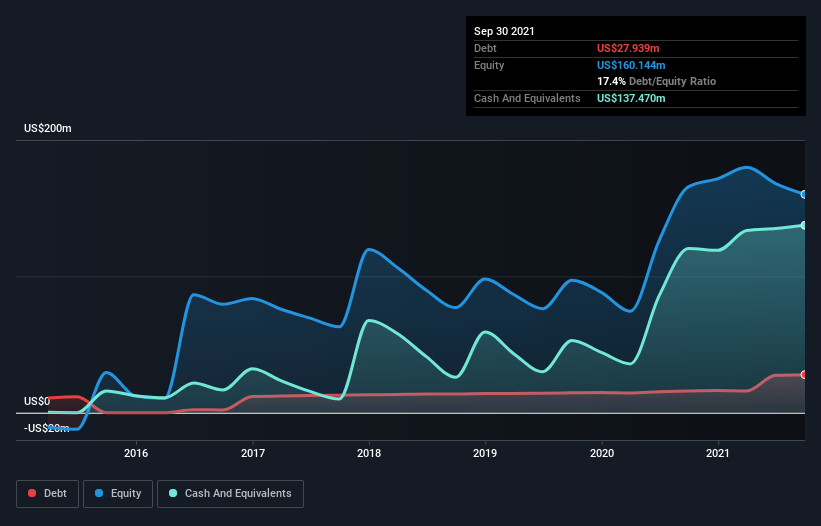Warren Buffett famously said, 'Volatility is far from synonymous with risk.' So it seems the smart money knows that debt - which is usually involved in bankruptcies - is a very important factor, when you assess how risky a company is. We note that VBI Vaccines Inc. (NASDAQ:VBIV) does have debt on its balance sheet. But should shareholders be worried about its use of debt?
Why Does Debt Bring Risk?
Debt is a tool to help businesses grow, but if a business is incapable of paying off its lenders, then it exists at their mercy. Ultimately, if the company can't fulfill its legal obligations to repay debt, shareholders could walk away with nothing. However, a more common (but still painful) scenario is that it has to raise new equity capital at a low price, thus permanently diluting shareholders. Having said that, the most common situation is where a company manages its debt reasonably well - and to its own advantage. The first thing to do when considering how much debt a business uses is to look at its cash and debt together.
See our latest analysis for VBI Vaccines
What Is VBI Vaccines's Net Debt?
The image below, which you can click on for greater detail, shows that at September 2021 VBI Vaccines had debt of US$27.9m, up from US$15.9m in one year. But on the other hand it also has US$137.5m in cash, leading to a US$109.5m net cash position.

How Strong Is VBI Vaccines' Balance Sheet?
The latest balance sheet data shows that VBI Vaccines had liabilities of US$32.9m due within a year, and liabilities of US$31.1m falling due after that. On the other hand, it had cash of US$137.5m and US$2.89m worth of receivables due within a year. So it actually has US$76.3m more liquid assets than total liabilities.
This surplus suggests that VBI Vaccines is using debt in a way that is appears to be both safe and conservative. Because it has plenty of assets, it is unlikely to have trouble with its lenders. Succinctly put, VBI Vaccines boasts net cash, so it's fair to say it does not have a heavy debt load! The balance sheet is clearly the area to focus on when you are analysing debt. But it is future earnings, more than anything, that will determine VBI Vaccines's ability to maintain a healthy balance sheet going forward. So if you're focused on the future you can check out this free report showing analyst profit forecasts.
Over 12 months, VBI Vaccines made a loss at the EBIT level, and saw its revenue drop to US$714k, which is a fall of 51%. To be frank that doesn't bode well.
So How Risky Is VBI Vaccines?
Statistically speaking companies that lose money are riskier than those that make money. And in the last year VBI Vaccines had an earnings before interest and tax (EBIT) loss, truth be told. Indeed, in that time it burnt through US$40m of cash and made a loss of US$66m. Given it only has net cash of US$109.5m, the company may need to raise more capital if it doesn't reach break-even soon. Even though its balance sheet seems sufficiently liquid, debt always makes us a little nervous if a company doesn't produce free cash flow regularly. The balance sheet is clearly the area to focus on when you are analysing debt. But ultimately, every company can contain risks that exist outside of the balance sheet. For instance, we've identified 4 warning signs for VBI Vaccines (1 is significant) you should be aware of.
At the end of the day, it's often better to focus on companies that are free from net debt. You can access our special list of such companies (all with a track record of profit growth). It's free.
New: Manage All Your Stock Portfolios in One Place
We've created the ultimate portfolio companion for stock investors, and it's free.
• Connect an unlimited number of Portfolios and see your total in one currency
• Be alerted to new Warning Signs or Risks via email or mobile
• Track the Fair Value of your stocks
Have feedback on this article? Concerned about the content? Get in touch with us directly. Alternatively, email editorial-team (at) simplywallst.com.
This article by Simply Wall St is general in nature. We provide commentary based on historical data and analyst forecasts only using an unbiased methodology and our articles are not intended to be financial advice. It does not constitute a recommendation to buy or sell any stock, and does not take account of your objectives, or your financial situation. We aim to bring you long-term focused analysis driven by fundamental data. Note that our analysis may not factor in the latest price-sensitive company announcements or qualitative material. Simply Wall St has no position in any stocks mentioned.
About OTCPK:VBIV.Q
VBI Vaccines
A commercial-stage biopharmaceutical company, develops and sells vaccines to treat immuno-oncology and infectious disease.
Medium-low and slightly overvalued.
Similar Companies
Market Insights
Community Narratives



